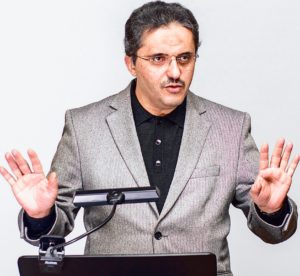Abdullah Bozkurt/Stockholm
A bounty offered by the Turkish government for information on critics and opponents of authoritarian President Recep Tayyip Erdoğan has enticed an array of informants in diaspora communities to spy on them and report to Ankara.
According to confidential documents obtained by Nordic Monitor, one such case was recorded in Germany, where an informant passed private information about a US-based journalist and author who has been critical of Erdoğan to Turkish authorities to claim the reward money.
On March 16, 2021 a Turkish woman named Seda Sultan, who lives and works in Germany, sent an email to the Security General Directorate (Emniyet), Turkey’s main law enforcement agency. She said she was in possession of the current residential address, phone number and email addresses of Ahmet Kurucan and would share the information in exchange for the reward.
Kurucan, who has been living in the US for more than 20 years, wrote opinion pieces critical of the Erdoğan government for Zaman, at one time Turkey’s most highly circulated newspaper. Zaman, which used to sell 1.2 million copies a day at its peak, was seized by the government in March 2016 as the government wanted to silence the mainstream daily, which was exposing corruption in the Erdoğan government and revealing clandestine intelligence operations that aided and abetted armed jihadist groups. It was closed down by the government four months later.
The journalist continues to write op-eds for the Tr724 Turkish news website operating out of Belgium. He has also been involved in a number of interfaith dialogue and cultural organizations in the US. Turkey has asked for the journalist’s extradition, but the US State Department said the United States is not convinced of Turkey’s accusations against him and asked Turkish authorities to provide concrete evidence for the extradition request.
The email sent by a Turkish resident of Germany about a critical journalist in the US:
The informant in Germany wrote in her email that she came across the Emniyet’s website, which listed people wanted by Turkey and spotted Kurucan on the list. She expressed her desire to hand over the information and get the reward offered by the government.
Stating that she was not very good at Turkish, Sultan wrote the message in English. “If we could cooperate together with the government of turkey, I can provide a current phone number and also a valid residential address which might be his current place of living. And a valid email address. I have proof that he is in possession of this number,” Sultan said.
Sultan’s email prompted a fresh criminal investigation into Kurucan, who has faced multiple charges on bogus cases launched by the Erdoğan government since 2015. Yusuf Fatih Akay, head of the counterterrorism bureau at the Ankara police department, forwarded the informant’s email to the Ankara Chief Public Prosecutor’s Office on August 5, 2022 along with the police investigation file.
The secret police investigation file revealed that the Turkish Foreign Ministry had already identified Kurucan’s residence in the town of Clifton, New Jersey, and shared the information with other branches of the government. Kurucan’s declaration of his address in five wire transfers to Turkey via MoneyGram in the amount of $2,270 in total between 2017 and 2019 were also spotted by Turkish authorities and added to his case file.

Created in October 2015 in an effort to emulate the FBI’s most wanted list, Turkey’s list in the beginning included 101 names, then the number jumped to 676 in two months’ time. As of January 2021 there were 1,300 suspects on the list divided into five color-coded categories, with red designating the most wanted, followed by blue, green, orange and grey.
There is no satisfactory official explanation as to which color corresponds to what. The Turkish police also announced a cash reward for anybody who provides information that leads to the capture of suspects. As of 2019, the reward ranged between half a million and 10 million Turkish lira depending on category.
The government added many members of the the Gülen movement, a faith-based group that is critical of the Turkish president and his government on a range of issues, to the list as part of an intimidation campaign to stifle dissent and suppress the opposition. The movement, mainly active in education, interfaith dialogue and outreach activities, has never been associated with any sort of violence since the 1960s, when it was launched by Fethullah Gülen, now a US resident and a fierce critic of the Erdoğan regime.

According to regulations, the reward limits are increased each year in line with official rates announced by the tax authority under the revaluation process (yeniden değerleme), which determines the value of assets adjusted for inflation. The rate of revaluation for the year 2020 was 9.11 percent, and it increased to 36.20 percent in 2021 and 122.93 percent in 2022. As a result the highest cash reward amounts to over 33 million Turkish lira, or roughly $1.8 million as of the current day. The cash is paid by the Interior Ministry, and the identity of the informant is kept secret. The informant does not need to be a Turkish national.
Hundreds of opponents of the Erdoğan government have landed on these lists in recent years as people wanted on terrorism charges amid blatant abuse of the criminal justice system to punish dissidents in politically motivated, sham cases that lack evidence to warrant serious accusations.
Turkey also escalated transnational repression to suppress criticism abroad and established a spy and informant network to harass opponents and collect information about them in violation of the host countries’ laws.
Police communiqué about the tip received from a Turk in Germany who informed on a US-based Turkish journalist:
Turkey’s informant network in diaspora communities, especially in Europe, has expanded greatly since 2014, when Erdoğan found himself incriminated in massive corruption investigations that were made public in December 2013. The corruption case files exposed how Erdoğan and his accomplices enriched themselves in kickbacks, bribery, abuse of power and money laundering schemes for the Iranian regime. When evidence in the form of wiretaps, banking records and video and photo surveillance was revealed, four ministers had to resign from the Erdoğan cabinet.
The Turkish president accused his opponents, mainly members of the Gülen movement, at home and in Western countries, of orchestrating the graft probes to oust him from power in what he called a judicial coup. Thousands of judges and prosecutors including those who were involved in the investigation of government officials were dismissed as he initiated an unprecedented crackdown on the movement.
President Erdoğan publicly appealed to his followers and encouraged them to make use of the informant hotline to tell police and prosecutors about his critics. Organizations aligned with Erdoğan in Europe had even run a campaign in 2016, advertising how expatriates should inform Turkey about people whom they knew to be Gülenists. Nordic Monitor reported several times in the past how Erdoğan’s call found an audience in the large Turkish diaspora in Europe, resulting in the victimization of many Turks who do not share Erdoğan’s Islamist vision and object to his government’s policies.
Secret Turkish government document reveals that Kurucan was tracked in the US by agents of the government of President Recep Tayyip Erdogan:
There are no updated official statistics on how many were informed on by this network. But according to an October 2016 statement issued by the Turkish police, the tips it received on Gülenists had totaled 40,000 in three months, overwhelming the police department.
Critics profiled by the government are subject to surveillance by agents of Turkish intelligence agency MIT abroad and are often denied consular services such as power of attorney and birth registry as well as having their passports revoked. Their assets in Turkey are seized and their family members at home risk criminal charges.
The Erdoğan government brands all of its critics as terrorists, and more than 100 journalists are currently locked up in Turkish prisons on terrorism charges, making Turkey one of the world’s leading jailers of journalists. Over 30 percent of all Turkish diplomats, 60 percent of all senior police chiefs, half of all military generals and some 30 percent of all judges and prosecutors in Turkey were also declared terrorists overnight in 2016 by the executive decisions of the Erdoğan government without any effective administrative investigations and certainly without any judicial proceedings.












